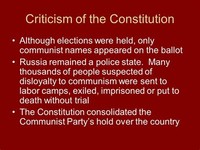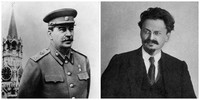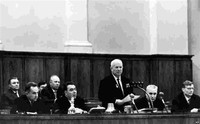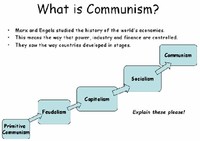Facts about Communism

Criticism of communism has come from many different camps, from communists and anti-communists alike.

Marx and Engels reserved the term communism for a final stage of society in which class differences had disappeared, people lived in harmony, and government was no longer needed.

Marx explicitly distinguished his communism from previous “utopian” religious or ethical socialisms.

Communism in the twentieth century proved to be one of the most heinous perpetrators of violence and genocide.

Some of the most creative and insightful critiques of communism developed in France during the 1970s and 1980s through the writings of Bernard-Henri Levy, Max Glucksmann, and Jean-Marie Benoist.

The word communism is now mainly understood to refer to life under conditions of Communist party rule, which since 1989 has dwindled to only a few states, such as North Korea, Vietnam, and Cuba.

Trotsky’s and Stalin’s views differed on how to advance world communism.

After Trotsky's exile, world communism fractured in two distinct branches: Stalinism and Trotskyism.

Under these circumstances, it was necessary for the communists, according to their ideological mission, to create a working class before communism could ever hope to be realized.

Communism, particularly the Soviet sphere of influence, had been vastly strengthened by the incorporation of the nations of Eastern Europe into what became the Warsaw Pact.

According to Marx’s arguments for communism, the main characteristic of human life in class society is alienation.

Henceforth, the term "communism" was applied to the ideology of the parties founded under the umbrella of the Comintern.

Eduard Bernstein, in his 1895 Cromwell and Communism, argued that several groupings in the English Civil War, especially the Diggers (or "True Levellers") espoused clear communistic, agrarian ideals.

Communism provides a vehicle for overcoming alienation by allowing the workers to feel a sense of ownership over the product of their labor after the overthrow of capitalism.

Stalin attempted to build communism via a massive program of industrialization and collectivization.

A key concept that distinguishes Maoism from other left-wing ideologies is the belief that the class struggle continues throughout the entire socialist period as a result of the fundamental antagonistic contradiction between capitalism and communism.

Among mainstream writers, Alexander Solzhenitsyn, a Soviet citizen and a Nobel Laureate, did the most to reawaken opposition to communism in the West.

The usage of the terms "communism" and "socialism" shifted after 1917, when the Bolsheviks changed their name to the Communist Party and installed a single-party regime devoted to the implementation of socialist policies.

Communism maintains that history has gone through a process of necessary revolutions which have focused on which sector of society controls the means of production.

The most widely reported ancestries in Maryland are African-American (29.02 percent), German (15.7 percent), Irish (11.7 percent), English (9 percent), Hispanic (6 percent), unspecified American (5.8 percent), and Italian (5.1 percent).

Khrushchev’s rise to power demonstrated that communism was not truly "international" in character.

Some writers go beyond attributing large-scale human rights abuses to Communist regimes, presenting events occurring in these countries, particularly under Stalin, as an argument against the ideology of communism itself.

In 1950 North Korea attacked South Korea, marking the first military confrontation between communism and the West.

Communism refers to a theory for revolutionary change and political and socioeconomic organization based on common control of the means of production as opposed to private ownership.

After the success of the October Revolution in Russia, communism became a social institution.

By the early 1980s, approximately one-third of the world's population lived under Communism.

In 1959 communism established a beachhead in the Western hemisphere when Fidel Castro assumed power in Havana.

Communism maintains that history has gone through a process of necessary revolutions which have focused on which sector of society controls the means of production.